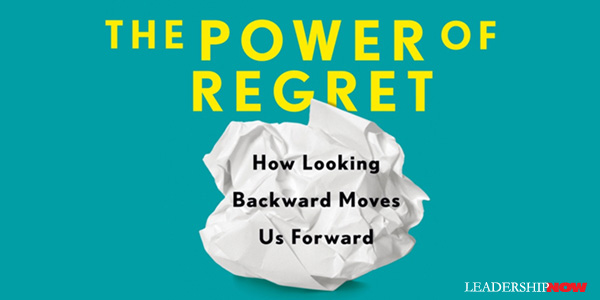 |
 |
02.11.22

The Power of Regret
WE must be clear. Bad choices lead to regret. We don’t want regrets. But regrets themselves are not bad. And they can lead us to better choices. In that sense, they have the power to change our life. In The Power of Regret, Dan Pink claims, “Regret is not dangerous or abnormal, a deviation from the steady path to happiness. It is healthy and universal, an integral part of being human. Regret is also valuable. It clarifies. It instructs. Done right, it needn’t drag us down; it can lift us up.” That’s good. Consequences clarify. Anyone who says they have no regrets is in denial. It is very human to make poor choices and regret them. We also make good choices that we should celebrate. Poor choices do derail our hopefully steady path to happiness. When we do make poor choices and feel regret, it is Pink’s wish that we deal with it constructively to “make better decisions, perform better at work and school, and bring greater meaning to your life.” The Power of Regret is a path to a better and more intentional life. Hindsight creates regret or what is termed counterfactual thinking—“If only I....” Finding what you can be thankful for if the situation could have turned out worse than it did—gratitude—can lead to the thought, “At least... .” (“At Leasts don’t alter our behavior or boost our performance in the future, but they do help us reassess the present.”) What Can Regret Do For Us? Sometimes we just can’t stop ourselves even though we know better. We just keep digger the hole we’re in deeper. A London Business School study found that “getting people to think about a previous escalation of commitment, and then to regret it, decreased their likelihood of making the error again.” Not surprising. Pink finds three broad benefits to regret when handled correctly: 1. Regret Can Improve Decisions Learning from regret helps us is makes us stop and think. They slow us down. “We collect more information. We consider a wider range of options. We take more time to reach a conclusion.” We need the ability to regret our poor decisions—to feel bad about them—precisely so we can improve those decisions in the future. 2. Regret Can Boost Performance If we take the time to think about what and how we did, we can often improve our performance next time. Even reflecting on what other people have experienced can improve our own choices and outcomes. To be sure, regret doesn’t always elevate performance. Lingering on a regret for too long, or replaying the failure over and over in your head, can have the opposite effect. 3. Regret Can Deepen Meaning Sometimes asking ourselves “What if” can lead us to a greater appreciation of what we did or didn’t do. “Conducting a ‘midlife review’ focused on regrets can prompt us to revise our life goals and aim to live afresh.” But as Pink observes, we often don’t handle our regrets properly. The feelings surrounding regret can be handled in three ways: ignore them, overindulge them or think about them. It has to do with our philosophy on what feelings are for. If we think feelings should just be ignored and dismissed, we just delay facing the emotions we have locked up inside. If we think that feelings are for feeling—to be indulged—then we run the risk of rumination and regurgitating past mistakes that impedes growth. On the other hand, if we believe feelings are for thinking, we face them and use them for improving future behavior.
Framing regret as a judgment of our underlying character—who we are—can be destructive. Framing it as an evaluation of a particular behavior in a particular situation—what we did—can be instructive. Suppose you forgot a loved one’s birthday. A regret about being a clueless, uncaring person won’t help. However, if it is a reoccurring regret, it’s probably is a character issue. Pink identifies and discusses four core regrets: foundation regrets (our failure to be responsible, conscientious, or prudent), boldness regrets (the choices we didn’t make), moral regrets (when we behave poorly or compromise), and connection regrets (neglecting relationship). We have regrets of action (things we did) and regrets of inaction (things we wish we did). Pink informs us on how to be deal with each kind. We can also use the specter of regret to alter our behavior before the fact and avoid regret altogether. This is also known as counting the cost and thinking actions through to consequences. Anticipating our regrets slows our thinking. It applies our cerebral brakes, giving us time to gather additional information and to reflect before we decide what to do. Anticipated regret is particularly useful in overcoming regrets of inaction. But anticipated regret can cause us to overthink, resulting in decision paralysis and risk aversion. Interestingly, Pink shares studies that show that overthinking regret can increase our sensitivity to regret—“both experienced and anticipated.” They had regrets “before they made their choices. After they made their choices. While they made their choices. Whatever the situation, they always imagined the possibilities of something better if only they had acted accordingly.” This doesn’t lead to the productive feeling is for thinking regret response. What is the solution? “Our goal should not be to always minimize regret. Our goal should be to optimize it. To make it clearer, Pink offers the Regret Optimization Framework, which leads us to devote our time to only the four core regrets. Pink concludes: “Regret makes me human. Regret makes me better. Regret gives me hope.” 
Posted by Michael McKinney at 09:13 AM
|
BUILD YOUR KNOWLEDGE
 

How to Do Your Start-Up Right STRAIGHT TALK FOR START-UPS 
Grow Your Leadership Skills NEW AND UPCOMING LEADERSHIP BOOKS 
Leadership Minute BITE-SIZE CONCEPTS YOU CAN CHEW ON 
Classic Leadership Books BOOKS TO READ BEFORE YOU LEAD |